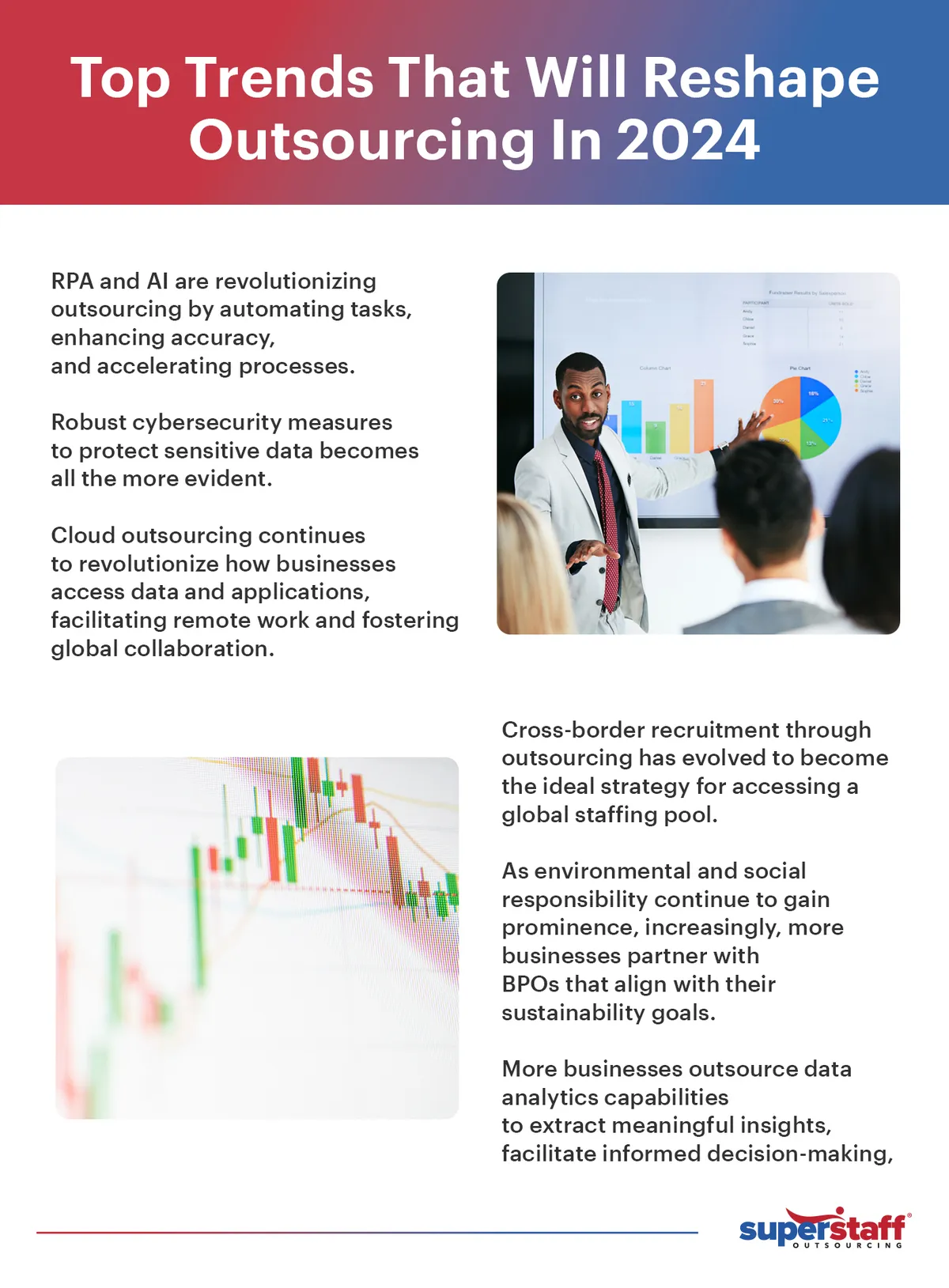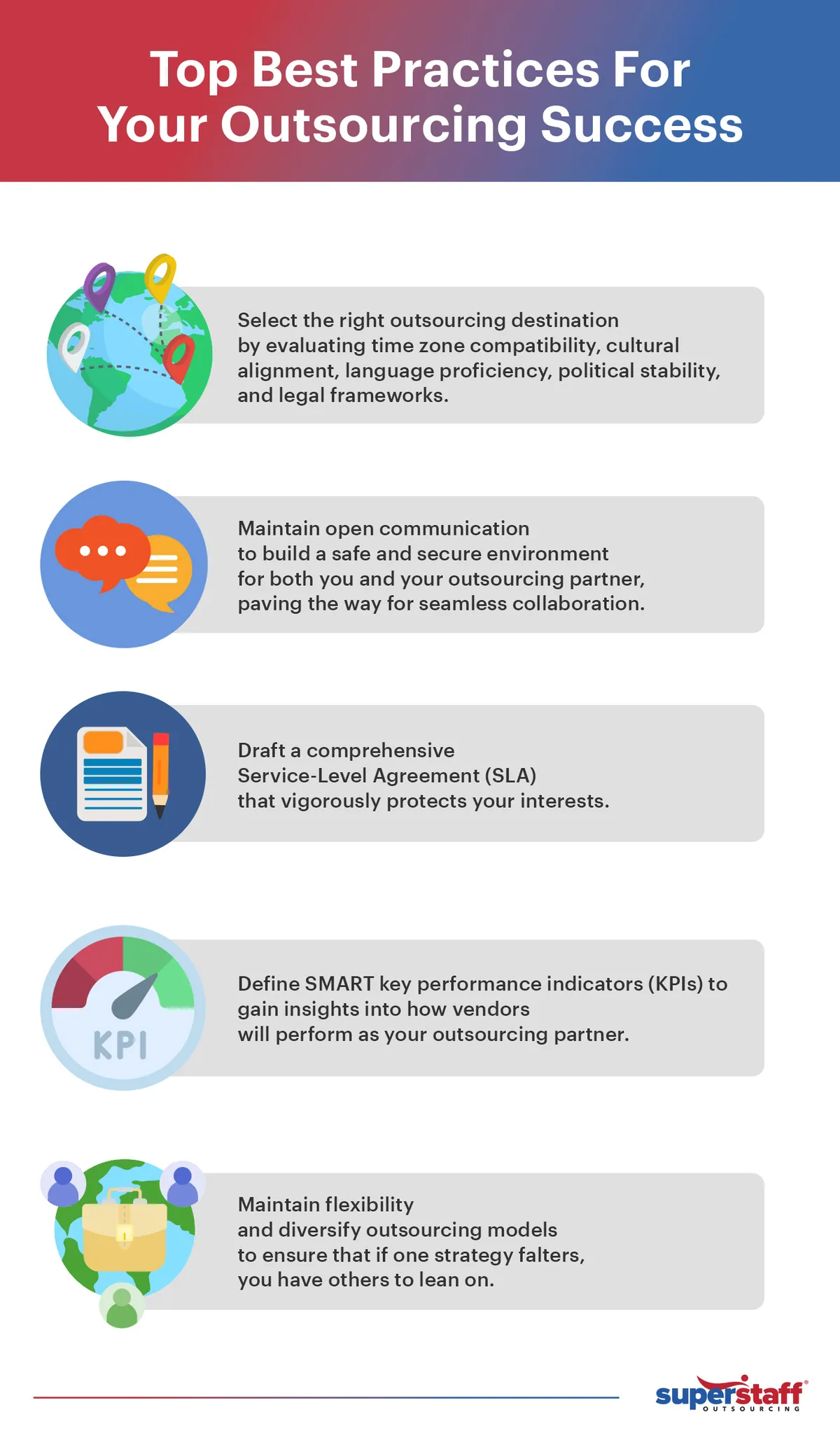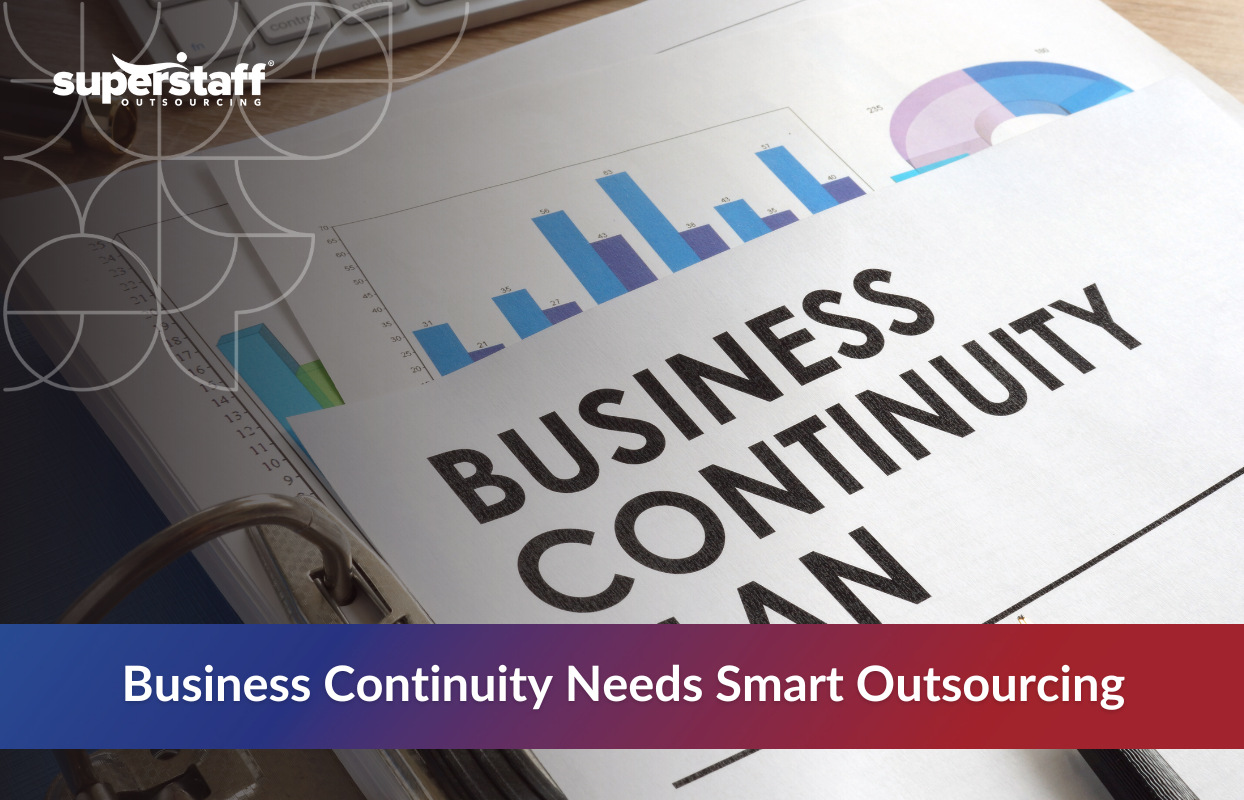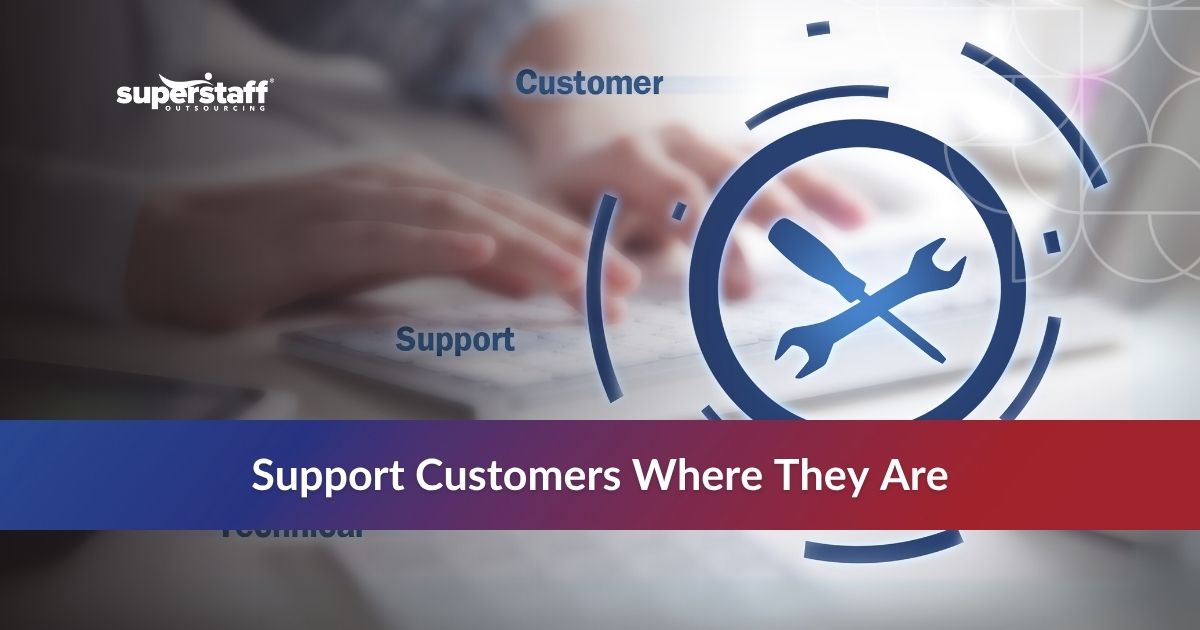
Outsourcing empowers companies by delegating non-core functions to offshore and nearshore workers and attaining a competitive cost advantage in the process.
With 2024 expected to focus on innovation and automation, it can spark a renaissance in outsourcing. Let’s dive into the emerging trends expected to redefine the outsourcing industry this year.
BPO Outsourcing Definition & Examples
Balancing several tasks at a time may seem more efficient, but often, the outcome doesn’t justify the process. While it may seem like you’re making headway on your to-do list, the reality is that you’re not giving each task the attention it deserves. You’ll probably make more mistakes, costing you more time and money.
How can you maximize your productivity and budget while keeping all parts of your business up and running? By outsourcing non-core tasks to a business process outsourcing (BPO) provider.
Outsourcing is when you delegate some of your business functions to a BPO company, allowing you to concentrate on your core competencies, such as improving product quality and online presence. This strategy gives you access to a pool of skilled and qualified talent at a much more cost-efficient rate.
We can categorize outsourcing models into:
- Offshore: Delegating your tasks to a team in faraway countries like the Philippines.
- Nearshore: Working with a team living in nations within your vicinity, like Colombia.
- Onshore: Collaborating with professionals in the same country, city, or region.
Emerging Trends To Redefine the Outsourcing Industry in 2024
From merely a cost-cutting solution, outsourcing has metamorphosed into a potent tool that propels innovation and mobilizes business growth.
What hottest outsourcing trends will rock the business world in 2024? Let’s find out.
Rise of Artificial Intelligence (AI) and Robotic Process Automation (RPA)
RPA and AI have become critical drivers of efficiency and productivity in 2024. Increasingly more businesses leverage these tools to gain a competitive advantage in their respective industries. While RPA handles repetitive tasks, enabling humans to focus on higher-value endeavors that require creativity and critical thinking, generative AI produces supplementary content, including imagery, audio, text, and synthetic data, pushing the boundaries of automation.
The current trajectory of their market growth also showcases substantial and rapid expansion in its adoption:
- The RPA will record a compound annual growth rate (CAGR) of 39.9%.
- Generative AI can add $2.6 trillion to the global economy.
With both technologies’ immense significance and promising future, the BPO industry has also embraced RPA and AI — revolutionizing outsourcing by automating tasks, enhancing accuracy, and accelerating processes.
Focus on Cybersecurity Outsourcing
As more businesses shift online, the critical importance of robust cybersecurity measures to protect sensitive data becomes evident.
Neglecting this aspect of business can lead to significant financial losses for companies, stemming from cybercrimes like identity theft, embezzlement, and fraud — with global cybercrime damages expected to rise 15% annually and hit $10.5 trillion by 2025.
In the face of escalating cyber threats that pose significant business risks, proactive security measures are no longer negotiable. Your best bet is to outsource cybersecurity teams adept in securing data handling, encryption protocols, and adherence to international security standards. Outsourced cybersecurity experts are also trained to comply with security standards such as GDPR, CCPA, and HIPAA to monitor transactions while preventing unauthorized access to your confidential databases.
Increased Adoption of Cloud Outsourcing
Cloud infrastructure has revolutionized how businesses access data and applications, facilitating remote work and fostering global collaboration. Initially hailed for its cost-saving advantages and competitive edge, businesses now view it as an essential driver for innovation, agility, and success.
By 2024, the adoption of multi-cloud solutions is expected to rise significantly from 76% to 85%. As more businesses increasingly embrace cloud-based solutions, the cloud’s potential to reshape data governance amplifies.
Global Workforce Collaboration
Outsourcing is a means to make the workforce more interconnected. From a way to navigate the talent crunch, cross-border recruitment has evolved to become the ideal strategy for accessing a global staffing pool. Rather than limiting recruitment efforts to the best candidates in your area, this strategy enables businesses to scout and recruit the most qualified professionals worldwide.
Outsourcing also provides a competitive edge by connecting businesses with a global workforce. Employees engaging in a diverse outsourcing environment gain invaluable exposure to various cultural perspectives and work styles.
This exposure not only enhances their understanding of diversity but also cultivates skills in communication, empathy, and collaboration across different cultures. As a result, employees become better equipped to build authentic relationships with international clients, fostering deeper connections and understanding, which are vital for successful global partnerships.
Focus on Sustainability Outsourcing
It has become an ethical imperative for companies to adopt corporate social responsibility (CSR) objectives that empower communities, build trust with stakeholders, and nurture a sustainable future for their business and society. Besides helping companies stay socially accountable, CSR enhances goodwill and protects against customers’ hostile perceptions towards the brand.
As environmental and social responsibility continue to gain prominence, consider outsourcing partners that align with your organization’s sustainability goals. Evaluate their ecological footprint, commitment to ethical labor practices, and social responsibility initiatives. This proactive approach cultivates a responsible supply chain and generates positive stakeholder resonance.
Outsource Data Analytics for Informed Decision-Making
Businesses can no longer deny data’s importance in the digital age. A recent poll showed that many employees (41%) and employers (38%) value data analytics as knowledge critical in improving performance. Another study predicted that with a CAGR of 11.33%, the global data analytics outsourcing industry will hit $9.15 billion by 2030 — almost a threefold jump from only $3.87 billion in 2022.
These numbers reflect the significance of data in 2024. Data is a gold mine of information. Yet, without the expertise to extract insights, data exists as mere scattered particles within virtual space — which explains the growing trend of companies outsourcing data analytics. This strategic move allows them to extract meaningful insights, facilitate informed decision-making, enhance customer experiences, and optimize operational processes.
Mastering Outsourcing: Best Practices for Success
In today’s dynamic market, outsourcing has become a cornerstone strategy for many organizations seeking efficiency, flexibility, and specialized expertise.
Let us explore the best practices and strategies to leverage outsourcing better and pave the way for unparalleled success in your ventures.
Formulate Clear Goals and Requirements
Before outsourcing, you must clearly understand your organization’s needs and goals. Assess your business processes and determine the pain points that stand in the way of success.
Once you’ve identified your weaknesses, it’s time to determine the specific outsourcing needs to address these internal challenges, whether they involve gaps in your workforce, qualifications, or essential business functions. This is a crucial reference point when communicating your requirements to your chosen outsourcing provider.
Choose the Optimal Outsourcing Destination
Selecting the right outsourcing destination goes beyond cost considerations. You must consider time zone compatibility, cultural alignment, language proficiency, political stability, and legal frameworks. It would be best to balance cost-effectiveness and a conducive business atmosphere.
For offshoring, consider the Philippines, a top outsourcing destination in Asia that currently reigns as the “Call Center Capital of the World. Meanwhile, if you’re looking for a nearshore destination, Colombia, an emerging tech hub dubbed “Silicon Valley of Latin America,” is an equally strategic choice.
Establish Honest and Open Communication
Trust is a powerful tool that can make or break your revenue streams. Research shows that 91% of business leaders find that maintaining trust can enhance their companies’ bottom line. When you and your outsourcing partner have established trust, they will be more inclined to work diligently for your projects.
The key to achieving trust is communication. In scenarios where certain misunderstandings are inevitable, businesses must always maintain open communication lines so both parties can resolve their differences respectfully. This builds a safe and secure environment for you and your outsourcing partner, paving the way for seamless collaboration.
Invest in Training and Development
Prioritizing employee learning opportunities is a critical business focus for sustainable, enduring growth. But the reality is that the majority (71%) of employers experience upskilling difficulties, with lack of budget and workforce (43%), worker motivation (41%), and prioritization strategies (32%) posing as primary obstacles.
Despite these difficulties, businesses must find strategic and cost-effective means to upskill and reskill employees to stay agile amid economic uncertainty and global disruptions. When done right, businesses that upskill can yield higher returns on investments (ROIs) and profit margins than companies without training programs.
Monitor Performance and Quality
Selecting the ideal outsourcing partner that fits your business requirements can be challenging. However, by defining the right key performance indicators (KPIs) to evaluate different outsourcing providers, you can gain insights into how they will perform as your outsourcing partner. This strategic approach can lay the groundwork for a more informed decision.
Strategic KPIs typically abide by the “SMART” framework, an acronym that stands for specific, measurable, achievable, relevant, and time-bound. Leveraging the SMART technique helps companies establish concrete benchmarks and define desired outcomes.
You can evaluate which outsourcing vendor best fits your preference by setting these five KPIs:
- Cost Savings: Will partnering with this outsourced vendor reduce your overhead costs and improve your operational efficiency?
- Services Quality: Can your selected vendor meet or exceed your business expectations?
- Contract Compliance: Can the outsourcing vendor adhere to their contractual obligations and service-level agreements (SLA)?
- Privacy and Security: What measures do these outsourced professionals use to protect sensitive data?
- Scalability: Are the employees apt to operate cutting-edge software and machines?
Draft a Strong Contract
A well-drafted Service-Level Agreement (SLA) that vigorously protects your interests is the bedrock of a successful collaboration with an outsourcing provider. An SLA is an agreement between you and your provider defining your expectations, indicating the metrics by which services will be assessed, and the penalties should the provider fail to satisfy the agreed-upon service levels.
Since contracts are prone to deliberate or unintentional misinterpretation, submitting them to a certified legal counsel for review is wise. Once both parties have willingly finalized the agreement, it indicates their commitment to abide by its provisions. This means they fully consent to its terms and can no longer plead ignorance.
One key component of an SLA is an indemnification clause, a provision in which the outsourced partner agrees to compensate you if they breached any of its warranties. For instance, a vendor assures you that their accountants are certified. You may demand indemnity if you’ve discovered they’re not registered with any accounting body.
Maintain Flexibility
Customers’ wants and needs can shift rapidly, forcing companies to adapt swiftly. These shifts, coupled with ongoing global crises and downturns, can fuel uncertainty and apprehension among executives.
Fortunately, they can keep pace with shifting tides and future-proof their business by diversifying their outsourcing models. Instead of merely adopting an offshore outsourcing strategy, consider combining alternative outsourcing models, such as co-sourcing or nearshoring, to optimize your business operations.
Diversifying ensures that you have others to lean on if one strategy falters. This resilience allows companies to maintain flexibility and adaptability, which is crucial for navigating uncertain landscapes.
Take Your Business to New Heights With SuperStaff
At SuperStaff, we redefine the outsourcing experience by prioritizing excellence in every aspect. With a team of skilled professionals boasting industry-specific expertise, we tailor our services to suit your requirements. Whether it’s customer support, back-office tasks, technical assistance, or other specialized functions, we commit to delivering unparalleled quality and efficiency.
Our approach is not just about fulfilling tasks; it’s about fostering lasting partnerships. We integrate seamlessly into your workflow, functioning as an extension of your team. By aligning our goals with yours, we ensure a collaborative environment that breeds innovation, productivity, and outstanding outcomes.








